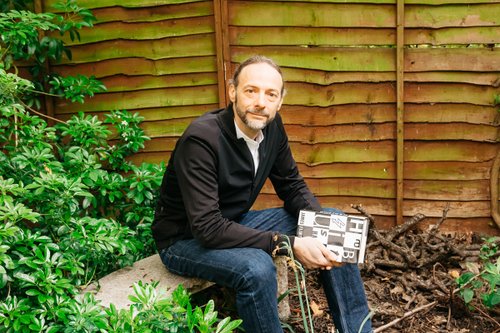Managers: how to take care of yourself before you reach breaking point
Feb 28, 2022
4 mins


CEO of Connection Leadership - Coach, speaker, author of “Reawaken your life through mindfulness meditation” and “My little routines : Boost your self-confidence” (in French, published by Marabout)
Being a manager isn’t a relaxing job. Good leaders have to deal with serious issues. That’s why it’s essential to preserve your energy, for your own sake and for others’. Managers are exposed to stress and the risk of burnout, which is why our expert Betsy Parayil encourages vigilance. Combining data and practical advice, she unpacks the issues around burnout and shares her solutions: coaching and meditation.
One of my best friends is known as the queen of public relations. When I was younger, I admired her ability to land dream jobs. Before the age of 30, she was in marketing-management positions in large corporations, transforming brand communication with her creative genius. But she has also experienced major career lows: burnout, depression, and a terrifying episode where she fell down the stairs at a work party. I remember visiting her not long afterwards and we spent the time on her bed folding little pieces of origami. She didn’t have the energy to do anything else.
Even if you haven’t experienced accident-inducing burnout, like my friend, lots of us have felt drained by the responsibilities we have as managers, especially during the pandemic. So, what can we do when exhaustion takes hold and drains us of the vital energy we need to get through the day?
Wellbeing at work: the untapped potential of meditation and coaching
The term “burnout” has been in use for more than 40 years, and today the majority of the population are aware of it. Since my first mindfulness meditation programs for business, I’ve discovered that many employees practice this discipline with applications such as Headspace or Calm, and some have even done MBSR programs (mindfulness-based stress reduction) with instructors. In some companies, sports and yoga classes, massage services and even nap rooms have been set up.
So why haven’t these things prevented us from burning out? Because they’re used sporadically as opposed to routinely, and are often coupled with personal or professional imbalances many managers feel they can’t overcome. They are correct. These imbalances are actually very complicated: they are a systemic problem that is out of companies’ hands. Businesses are trying to meet the demands of challenging digital consumers, who want everything instantly and at low cost, without considering the teams that work behind the scenes to make this possible, and the negative effects on other people and the planet.
Though it wasn’t the pandemic itself that encouraged us to develop bad habits at work, our tendency to put work goals front and center intensified in 2020 and 2021. Without the commute to the office or the distractions we found there, we focused more on the job at hand. Research has found that 90% of executives in the United States feel that with the democratization of remote working, their productivity is now at the same level or higher. With children at home, constant uncertainty and disruption, the stress of contamination, and sick employees, the Covid-19 crisis has proved a huge challenge—one that managers have overcome. But this incredible performance has a negative side: since the beginning of the pandemic, there has been a documented increase in cases of burnout. Sixty-seven per cent of workers think burnout has worsened during the Covid crisis, with 27% admitting they are unable to unplug from work. It’s interesting to note that in the long run, that increase in productivity could ultimately lead to a decrease in productivity.
Managers: how to take better care of yourself and your team
To cope with this new way of being, I advise managers to return to the basics of personal and professional balance. I encourage them to take care of themselves as well as their employees, and to be more aware of the systemic aspect of burnout and stress. It’s all about putting into practice the things they already know are good for them. Following up with meditation and coaching professionals is sometimes necessary, but here are some good practices that you can start implementing in your daily life.
Don’t neglect your health (we can’t stress this enough)
- Take regular breaks throughout the working day. And avoid long days over extended periods.
- Engage in a physical activity that helps you to destress.
- Adopt a gentler practice such as yoga or meditation, and develop your “centering” skills.
- Don’t wait until you are totally exhausted to finish your day. Set your schedule and make personal appointments ahead of time to take your mind off work.
Optimize work time
- Change your working practices to boost your energy, while decreasing the time you spend on particular tasks. Organize your schedule into “sprints” to increase productivity. Shorten the time spent in meetings, always use a diary, and designate a timekeeper.
- Manage the workload assigned to your department. If demand exceeds resources, bring it to the attention of your company’s HR division and prioritize the most essential tasks for your department as a team.
Look out for your colleagues
- Establish weekly sessions where you ask the team to share their inner weather: “Are the skies mostly sunny? Is there a storm brewing?”
- Take a moment to focus your attention on the team’s collective energy. Is it high or low? Is it scattered or focused? Incorporate practices that increase and focus energy.
- You can offer your co-workers a “time out” at the beginning of the meeting. Set an alarm for two minutes and have some quiet time together. This will allow them to mentally end the previous activity and be fully present for the task ahead.
Manage with a heightened awareness of others’ boundaries
- Take a moment to write down your observations about each of your employees. What do they need? What is their current level of motivation? Are you able to detect any weak points in the team?
- Assess their workload and the tools and resources that are available to them. Clarify your monitoring methods to ensure that what you are asking for is in line with the team’s capacity. How can you best support them? Is the situation balanced or unbalanced? Are the people you are responsible for able to move smoothly toward their goals? For overwhelmed employees, take some one-on-one time to help them prioritize their tasks.
- Create collective breaks in the team schedule. Plan time for breathing and reflection as well as productive working.
- Acknowledge your team’s efforts and provide feedback. Be generous with encouraging responses.
- Implement a self-compassion routine for yourself by using mantras. Close your eyes, breathe deeply, and let the following phrases echo in your mind: “May I be happy; may I be at peace, with a calm and open mind; may I be joyful, with good energy.” You can also dedicate these mantras to your team: “May my team be happy…”
These are all useful practices to recharge and inspire your team. They will contribute to a better balance between body and mind, at work and at home.
Photo: Welcome to the Jungle*
Follow Welcome to the Jungle on Facebook on LinkedIn and on Instagram and subscribe to our newsletter to get our latest articles every day!

More inspiration: Inspiration for decision-makers

Business ethics: how to do the right thing in a turbulent world
Alison Taylor's background is one of the reasons she talks about ethics in a way that makes sense to non-specialists. Here’s what we asked.
Mar 09, 2022

Sorry, but you're already living in the "Squid Game"
Meritocracy, infantilization and more. What if we told you Squid Game held up a mirror to our modern workplace? Here are 6 elements of proof.
Nov 18, 2021

James Flint: from tech journalist to tech for good
As one of the pioneers in tech journalism, James Flint parlayed his extensive experience to create Hospify & champion digital data privacy.
Jun 02, 2021

The making of a start-up: Ben Prouty on Poncho and other ventures
Ben Prouty on being a serial founder, when to step away and launching Poncho, a pioneering childcare company.
Feb 18, 2021

Tribute to Tony Hsieh: five lessons in management
The legendary founder of Zappos leaves behind him a strong legacy of and lessons on innovative management.
Dec 11, 2020
Inside the jungle: The HR newsletter
Studies, events, expert analysis, and solutions—every two weeks in your inbox

